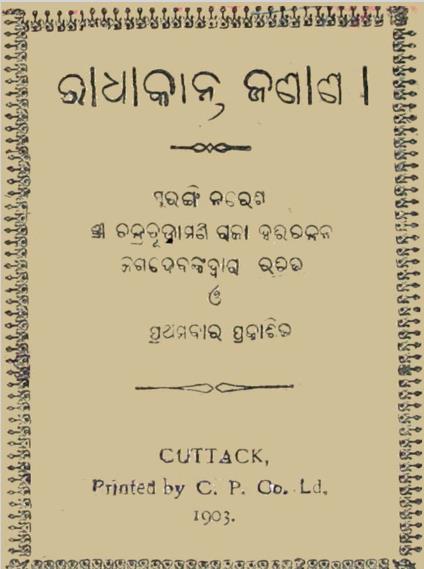Radhakanta Janana, published in 1903 by the esteemed poet Chandrachudamani Harichandana Jagadeb, is a significant contribution to Odia poetry that touches upon themes of love, devotion, and the divine. This collection, dedicated to Lord Krishna and his beloved Radha, encapsulates the profound spiritual and emotional connections that characterize the narratives of their divine love. Jagadeb’s work is notable not only for its lyrical beauty but also for its deep exploration of bhakti—devotional love within the framework of Odia literature.
At its core, Radhakanta Janana weaves a rich tapestry of poetic expressions centered around the relationship between Radha and Krishna. Jagadeb’s verses navigate the complexities of love, longing, and the spiritual dimensions of devotion, inviting readers to immerse themselves in this timeless narrative. The poems reflect various aspects of their relationship, from the ephemeral joy of union to the poignant sorrow of separation, encapsulating the intense emotional experiences that define their divine love story.
The title, Janana, which translates to birth or origination, suggests a celebration of love that transcends mortal limitations. Jagadeb portrays Radha as an emblem of devoted love, representing both the soul’s yearning for the divine and the embodiment of pure, unselfish affection. Through his poems, he invites readers to explore the depths of their own spiritual and emotional connections.
Jagadeb’s poetic style is marked by its gracefulness and musicality. The use of traditional Odia literary forms, combined with rich imagery, creates a sensory experience that elevates the emotional content of the poems. The verses often evoke vivid scenes from the pastoral landscape of Vrindavan, where the divine love story unfolds, immersing readers in a world of beauty and serenity.
His clever use of metaphors and similes enhances the expressive quality of his poetry. For instance, Jagadeb might compare Radha’s love to a lotus blooming in the moonlight, symbolizing purity and beauty against the backdrop of the divine. Such imagery not only amplifies the aesthetic appeal of the poems but also communicates deep philosophical insights about love and spirituality.
Published during a time when Odisha was experiencing a literary renaissance, Radhakanta Janana reflects the cultural milieu of early 20th-century Odisha. The era was marked by a resurgence of interest in folk traditions, spirituality, and the emotional lives of individuals. Jagadeb’s exploration of Radha and Krishna’s love aligns perfectly with the bhakti movement, which emphasized personal devotion and emotional engagement with the divine.
Through this collection, Jagadeb contributes to the rich heritage of Odia literature, reinforcing the significance of devotional poetry as a vehicle for spiritual expression. His works foster a deeper understanding of the cultural and spiritual ethos of Odisha, celebrating the region’s artistic legacy.
Radhakanta Janana continues to be celebrated for its lyrical depth and spiritual insights. It has inspired not just poetry enthusiasts but also scholars and devotees who seek to understand the complexities of divine love. The themes explored in Jagadeb’s work remain relevant, resonating with readers who find solace and inspiration in the poetic depiction of love and devotion.
Books Info
| Books name | Radhakanta Janana / ରାଧାକାନ୍ତ ଜଣାଣ |
| Author | Chandrachudamani Harichandana Jagadeb |
| No Of pages | 18 |
| Publisher | NA |
| Publication | 1903 |
| Printed At | Cuttack Printing Company Ltd. |
| Distributor | NA |

